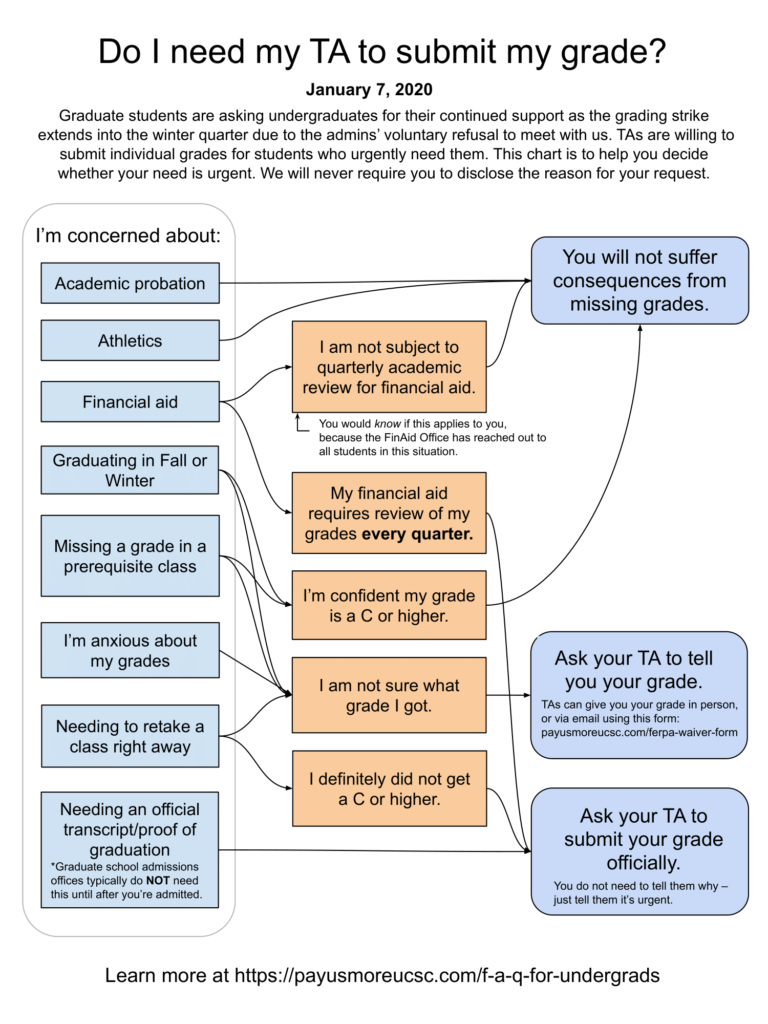TL;DR: The present conditions require us to shift into a new phase of organizing—as a first step, sign up to phone bank to help push us towards a sanctioned strike this quarter, and sign the ULP strike pledge for a sanctioned union strike.
The start of the new quarter gives us an opportunity to step back and assess the state of our movement. Our new working conditions in the age of COVID-19 are forcing us to reconsider our tactical choices. We know that we must continue to organize for the COLA we all need, but it is time to organize differently.
Until now, our offensive tactics have been wildcat strike actions. We held our ground most impressively in a grueling, month-long physical picket line at the Bay & High intersection, gathering widespread public support and igniting wildcat activities on other campuses. But we also faced serious and demobilizing setbacks. Disciplinary retaliation and sheer fatigue took their toll. Administrators and faculty joined forces to find new and inventive ways to prevent graduate workers from withholding final grades. The pandemic obliterated our familiar methods of in-person organizing. We must take these setbacks seriously, re-evaluate our collective power, and recalibrate our tactical horizons.
To that end, COLA organizers at UC Santa Cruz will agitate in the coming weeks for the authorization of our union’s statewide ULP strike. The first step is to sign up for phone banking. The second is to call meetings with, and call people in, your departments to spread the ULP strike pledge.
What is the ULP strike?
Our union, UAW 2865, has filed multiple Unfair Labor Practice (ULP) charges against the UC, including for its summary firing of over 80 wildcat strikers at UCSC, and for its refusal to bargain directly with the union over COLA. These unjust practices are severe enough that UAW’s statewide Bargaining Team is prepared to call an official strike, but only if enough union members are ready to withhold their labor when the call comes. The UAW’s current position on settlement for these ULP charges includes a raise to $40,000 per year for graduate student workers.
Why the ULP strike?
Make no mistake: the possibility of a ULP strike is a concrete victory in the COLA movement, and a genuine victory of the wildcat strike. Whereas we, as rank and file workers, once stood far ahead of the union, the union is now beginning to catch up to us. We are now well placed to combine our rank and file militancy with the union’s considerable resources and legal protections.
The current crisis conditions of the COVID-19 pandemic compound our precarious living conditions. In the thick of this crisis and the uneven distribution of its effects, the demand for a COLA is the demand to survive. We want to struggle, as workers all over the world are now struggling, with a renewed urgency. But we need protections, and we need greater numbers. On the eve of a historic economic depression, and with 3.3 million unemployment claims filed across the country last week, many among us are gaining a hesitancy about engaging in bold but risky wildcat actions, especially when confronted with an employer that would rather leave its workers without healthcare in a pandemic than bargain over a living wage.
A ULP strike is distinct from a wildcat strike because it is voted on by the full union membership, sanctioned by the union, and gives legal protections to every single worker on strike. These protections are necessary certainties in these uncertain times. They will allow us to strike against the university with the full weight of our statewide union behind us.
When will the ULP strike be?
The ULP strike is not the opposite of a wildcat strike. Both forms of strike are nothing without the power of the rank and file. If you have been following the official emails from our statewide union leadership, you may be under the impression that it is only a matter of waiting for the leadership to tell you when to strike.
But the truth is that our union leadership is cautious in its political outlook, and will only be decisive when pushed to decision from below. If union members muster up strike readiness in large numbers, leadership can be compelled to call a strike vote sooner. Otherwise, they will hesitate and postpone, and allow the weeks of Spring quarter to pass by. In other words, rank and file workers can determine the timeline of the ULP strike.
What happens to the withheld grades?
You may have heard about the administration’s “Last Chance Agreement” to reinstate fired wildcats. Due to the absurdly tight timeline (less than 24 hours) and the ambiguities of this “offer,” COLA wildcats have written to administrators asking for clarifications and outlining a counter-proposal.
Moreover, the reinstatement of Santa Cruz graduate student workers is a central plank of the UAW’s terms for settling its ULP charges. It is uncertain how this will play out and we will need to adjust strategically to developments in negotiations, at our campus, and on other campuses.
As with everything in the COLA struggle, the speed and terms of any outcome will depend on our strength at the time of negotiations. Our strongest position, at present, is to negotiate during a statewide sanctioned strike.
What we have always said nonetheless remains true: only Santa Cruz wildcats (and now wildcats at other campuses) decide when to submit grades, and under what circumstances.
Next
As we start the new quarter, we will regroup, reassess and rebuild infrastructure. We will be sending a survey over the next few days which will ask grads your thoughts on the strengths and weaknesses of the COLA movement so far, and what you want to see happen with the campaign going into Spring quarter. We will join a statewide intercampus General Assembly Friday April 3 at 11am (Zoom link forthcoming), and there will be a UCSC General Assembly soon (details TBC).
All of us have faced enormous uncertainty over the past months. Now, more than ever, is the time to build our collective strength to fight for a future full of security and certainty.
In power and solidarity,
COLA organizers

